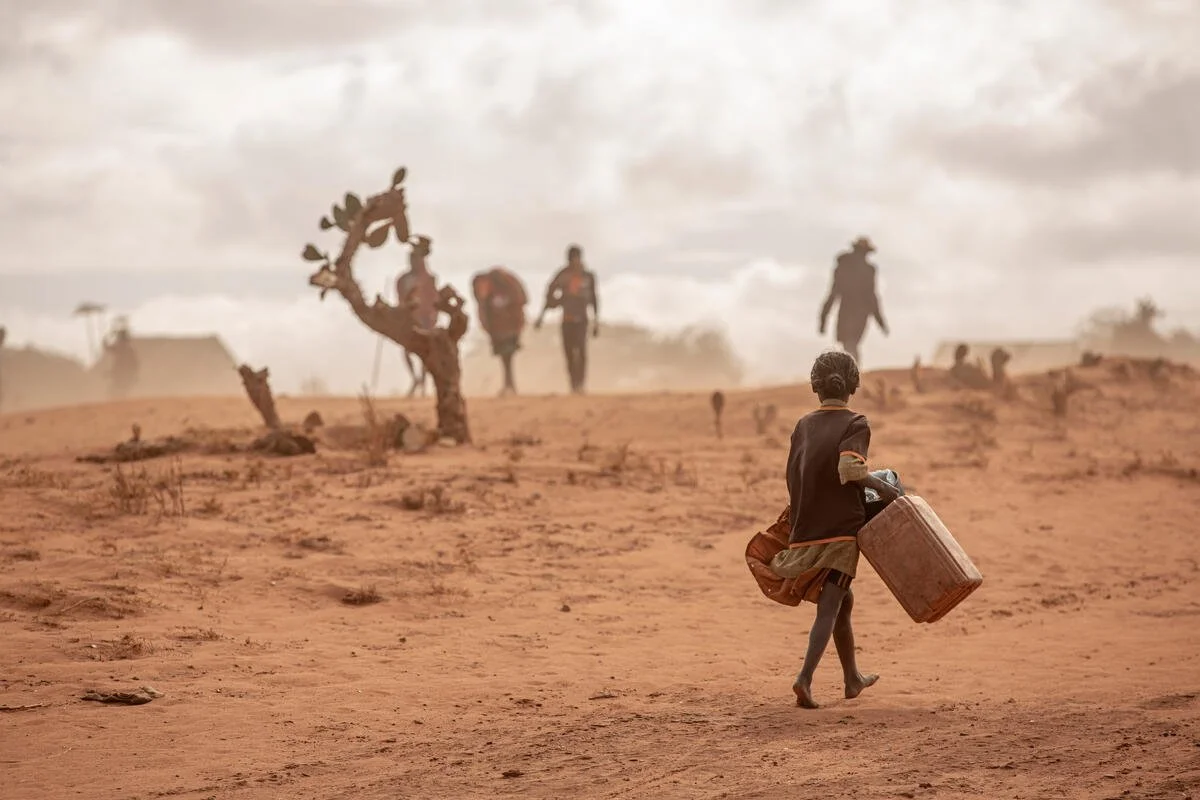COP26, Madagascar, and Adaptation in the Climate Crisis
1.5 degrees Celsius: one of the most media-catchy, well-known goals of the UN’s 26th Climate Change Conference of the Parties. To prevent or slow the impending climate doom, the call of activists and many attending COP26 was to keep global temperature rises below 1.5 C. Yet, this chant obscures much of the conference’s important job of dealing with what is happening now and the pressing matter for many climate justice activists—risk management and adaptation.
COP26 coincided with the news of Madagascar’s impending, dire famine, with the potential to be the first famine solely resulting from climate change. Madagascar is not facing civil war, political unrest, or any of the many other factors that often exacerbate famine preconditions. Instead, climate change-induced drought alone has led to failing harvests and an intense scarcity of resources. Many families are left to resort to unthinkable extremes to feed their children, such as mixing clay and tamarind for a food substitute or eating cactus leaves commonly fed to cattle.
Long term action with long term consequences was certainly a goal of COP26, but it is clear that climate change consequences in Madagascar and other vulnerable countries require solutions immediately.
Here, risk management and adaptation come in. Adaptation did feature on the COP26 agenda, with attendees such as the World Food Programme (WFP) calling for increased emphasis in the face of disasters, such as in Madagascar, and set adaptation as an official goal.
The WFP itself prioritises “see[ing] climate hazards coming before they turn into disasters” using financial aid, restoration methods, and creating “safety nets and insurance against climate extremes”. In Madagascar specifically, “microinsurance” programmes gave financial relief to farmers with failing crops.
Financial programmes are only one part of this risk management; the implementation of warning systems can help to minimise damages to ecosystems before major climate disasters strike. Both warnings and funds are necessary for the immediate future, which COP26 did seem to acknowledge.
COP26’s Adaption Research Alliance (ARA) Joint Statement was the culmination of adaption-based outcomes discussed over the conference’s two weeks. This research alliance does provide some hope; with the main focus being to “catalyse and scale investment in action-oriented research and innovation for adaptation that strengthens resilience.” This outcome does appear to have the potential to reap solutions.
There are many reasons why investment in research is an apt response. Firstly, it works to increase the efficacy of solutions already in place and those to come; funds and energy can be used correctly and minimise waste. Secondly, a research alliance encourages increased communication and sharing of knowledge, both factors absolutely crucial to governing the world’s climate crisis. Thirdly, the commitment to adaptation ensures that something is being done even when leaders and resolutions fall short in prevention of further temperature rises. Climate disasters, like the drought in Madagascar, will continue to happen through all the discussion, negotiation, and frustration.
The conversation of adaptation notably has a heavy emphasis on developing countries, but the disruptions to the climate are causing devastating natural disasters across the world, from flooding to wildfires. Nonetheless, some leaders from the Global South argue the most vulnerable nations are disproportionately feeling the detriments of climate change.
The sense of injustice raises questions regarding the roles different countries hold in minimising the impacts of climate change.
In the days before COP26, Madagascar’s President Andry Nirina Rajoelina made it clear that poorer nations were not to blame. The President stated, “my compatriots in the south are bearing the weight of climate change which they did not participate in creating.”
Madagascar’s Minister of Environment Baomiavotse Vahinala Raharinirina, who attended COP26, concurred with the President and described the widespread issues caused by climate change on her country. Raharinirina detailed how climate-caused migration from the south of Madagascar to the east has begun to occur. The Minister also explained that richer nations need to take more accountability for their contribution to the climate crisis through actionable response and finance.
During COP26, the calls for financial backing from developed, northern countries and the innovation from southern countries does reveal a unique opportunity.
Countries from the Global South, with more direct experience in addressing the negative ramifications of climate change, are leading the charge on adaptation such as through the ARA, which is self-described as “southern-led”. Similarly showcased at COP26 was the Africa Adaptation Acceleration Program, which focuses on improvement in data, infrastructure, job creation, and financial initiatives.
To provide backing, developed countries from the Global North set plans to achieve the missed $100 billion dollar funding goal by 2023, with many more pledging higher sums.
Together, solutions can be produced through North-South collaboration. Financial programmes are not the only way to attend to increasing strains on communities, but funding innovative research will ensure the best use of such programmes and systems of risk-management.
While many reflected on COP26 with a sense of despair, it seems that increased innovation with increased financial support could at least partially ameliorate the current impacts of climate change on many of the world’s most vulnerable communities.
Simply, these solutions are will not solve climate change. The crisis is still mounting and clearly needs to be seriously addressed. However, these solutions of adaptation are necessary to reduce suffering, and very likely death, in the wake of a crisis that world leaders are scrambling to slow.
Image courtesy of Tsiory Andriantsoarana via WFP, ©2021, some rights reserved.



